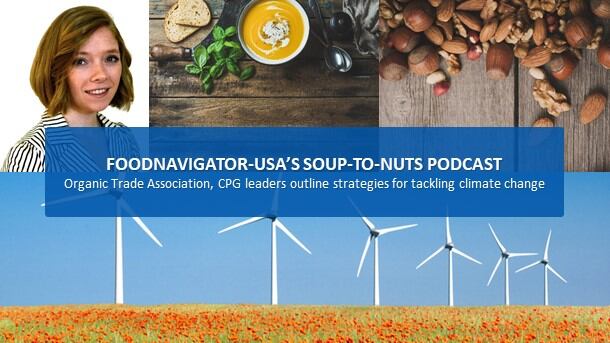In a recently published white paper, the trade group notes that the global average temperature increased by 1.8 degrees from 1901 to 2016, contributing to the extreme flooding, drought, heat, wildfires and ocean acidification that have intensified in recent years. Unless “drastic mitigation steps” are taken, OTA warns that Earth likely will warm another 2.7 degrees by 2052 – compounding an already dire environmental situation that is negatively impacting human wellbeing and much-needed infrastructure.
To help farmers and food manufacturers mitigate and adapt to the impact of climate change, an OTA task force over the winter established a set of 10 principles to help evaluate and advocate for public policy changes, including ways that organic can positively contribute – some of which leading food and beverage brands already are implementing across their supply chains with significant success.
In this episode of FoodNavigator-USA’s Soup-To-Nuts podcast, OTA CEO Laura Batcha shares these principles and provides an update on the trade group’s recent lobbying and legislative efforts. Speakers gathered by OTA, including from General Mills, Danone and Organic Valley, also share how they are using these principles as well as organic farming techniques and other strategies to tack climate change challenges.
[Editor's Note: Never miss another episode of FoodNavigator-USA's Soup-To-Nuts podcast -- subscribe today.]
10 standards for effective climate change action
At a fundamental level, OTA believes that any policy that addresses the role of climate change in food and agriculture is an opportunity for organic to shine as a climate change solution, but beyond this first fundamental principle, Batcha said policy standards and approaches to climate change must:
- Be science-based, data-driven and offer measurable outcomes,
- Focus on continuous improvement by rewarding good agricultural practices that build on positive outcomes,
- Promote soil health and carbon sequestration, which are cornerstones of organic,
- Reduce the use of fossil-fuel based chemicals, which organic does by prohibiting most synthetic pesticides and synthetic nitrogen that rely on “tremendous” inputs from fossil fuels to be made,
- Provide solutions to mitigate and adapt to climate change, which is currently impacting farmers,
- Offer incentives for adopting best practices, conservation and ecosystem services,
- Decarbonize the economy,
- Promote agricultural diversity, and
- Address the environmental and economic inequities of climate change throughout the value chain equally and inclusively.
Deep dive into soil health and carbon sequestration
Several leading food and brand manufacturers and OTA already are making strides in several of these areas, according to Batcha who adds that they can serve as real-life case studies for policy makers as they form legislation to address climate change.
For example with regards to carbon sequestration and improving soil health, Batcha notes that research OTA conducted with Northeast University across all 50 states shows that organic farms already have 17% more carbon sequestered because of farming techniques required to qualify for the USDA organic seal. These include composting, cover crops, crop rotation and reduced tillage.
Among the food manufacturers helping farmers adopt and benefit from these practices is General Mills, which committed in 2019 to advancing regenerative agriculture on one 1 million acres of farmland.
According to Christina Skonberg, who is the company’s sustainability lead for natural & organic, General Mills is achieving this in part by encouraging farmers to adopt organic and regenerative farming techniques by offering long-term agreements which lowers the risk threshold for transitioning farmers.
“When we talk about farmer incentives for transitioning to organic and using practices that confer ecosystem services like soil health and water quality, we feel we have a really big role to play in reducing risk for the farmer and guaranteeing a market for ingredient off-take. So that's what we're doing with our long-term agreement with Gunsmoke farms. And it's also what we're doing with leading edge organic farmers in Montana, who are supplying the wheat and peas for two of our top Annie's Mac & Cheese products through multi-year sourcing contracts,” Skonberg said.
She added, "There's no doubt that companies have a really critical role to play in addressing climate change, but I'd say that this crisis also requires strong policies that elevate organic and regenerative agriculture as a key path to reducing greenhouse gas emissions and drawing down carbon.”
Progress towards decarbonizing the economy
OTA’s call to decarbonize the economy as it intersects with agriculture and energy use may sound like a tall order, but Danone’s senior director food and agriculture impact Tina Owens said that Horizon Organic already is “moving the needle” towards this goal through its multi-faceted Next Frontier Project.
As she explains, the project also is creating incentives for farmers and improving soil health among other goals it shares with OTA.
“We're taking a multifaceted approach, which encompasses the whole of the Horizon Organic footprint from seed to farm, to shelf, to consumer. But we already have 11,000 organic acres enrolled within our broader soil health program to ensure that we're moving the needle on the ability to sequester carbon within the farmer's field and are also focused on efforts that will reduce emissions from the dairy barn, which will include ongoing investments in wind solar genomics, and more,” she said.
She added: “The next frontier project also includes elements of animal welfare and farm care and safety, which we'll be sharing more about as we move into this multi-year commitment, the brand announced a fund of $1.5 million annually to be distributed to our farmers in the form of both grants and loans for a total investment of $15 million between 2021 and 2030.”
Organic Valley also has a strong track record of more than a decade of pursuing renewable energy on its farms and helping farmers obtain grants to do the same through its Climate Start Farming program. As Nicole Rabobitsch, the director of sustainability at Organic Valley explained, the co-op also is helping farmers improve soil health, manage manure and protect farmland.
“Since 2008, organic Valley has been an outstanding supporter of renewable energy. We have programming where we assist our farmer owners to install projects on their own farms … through our climate smart farming program,” she said.
She explained the program provides technical and grant writing assistance to help farmers install projects on their own farms, and to date has secured over $8 million in financial incentives and installed over 70 climate smart projects related to energy, soil health, manure management and farmland protection.
Legislative support is needed
Rabobitsch added that while Organic Valley has made significant progress towards its shared goals with OTA, smart policy and legislative support could help drive implementation of its existing efforts at a much larger scale.
OTA’s director of legislative affairs and coalitions Megan DeBates agrees that industry has hit many major milestones on its own and through public-private partnerships. But, she Congress must do more to support programs to improve soil health, protect farmland investment, on-farm renewable energy and increase research.
She explained that during OTA’s virtual fly-in, congressional leaders and their staff were “overwhelmingly positive” about finding solutions an helping more farmers transition to organic. And, she adds, she expects upcoming legislation to more directly address these issues and the beneficial role of organic.




